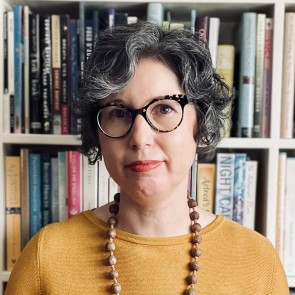
“Making History Visible: Black Lives under Nazism in Literature and Art”
Professional Background
Sarah Phillips Casteel is Professor of English at Carleton University, in Ottawa, Canada, where she is cross-appointed to the Institute of African Studies and the Institute for Comparative Studies in Literature, Art and Culture. After completing her undergraduate degree at the University of Toronto, she earned her MA, MPhil and PhD from Columbia University. Dr. Casteel has been a visiting fellow at the Zentrum Jüdische Studien Berlin-Brandenburg and a visiting professor at the University of Vienna and the University of Potsdam, where she held the Potsdam Postcolonial Chair in Global Modernities.
Dr. Casteel’s research is situated at the intersection of Black studies and Jewish studies. By developing innovative transnational and comparative methodologies, she seeks to illuminate the mutual entanglements of diaspora cultures. Her monograph Calypso Jews: Jewishness in the Caribbean Literary Imagination (Columbia UP, 2016) broadened discussion of Black-Jewish relations beyond the U.S. national frame by examining Caribbean writers’ invocations of the Sephardic expulsion and the Holocaust. To further advance emerging conversations between postcolonial studies and Jewish studies, Dr. Casteel co-edited Caribbean Jewish Crossings: Literary History and Creative Practice (U of Virginia P, 2019). Dr. Casteel’s earlier publications include her monograph Second Arrivals: Landscape and Belonging in Contemporary Writing of the Americas (U of Virginia P, 2007) and her co-edited volume Canada and its Americas: Transnational Navigations (McGill-Queen’s UP, 2010).
Dr. Casteel is the recipient of a Polanyi prize from the Government of Ontario, a Horst Frenz prize from the American Comparative Literature Association, and a Canadian Jewish Literary Award. Her research has been funded by several grants from the Social Sciences and Humanities Research Council of Canada.
Fellowship Research
During her fellowship at the Mandel Center, Dr. Casteel will be researching her third monograph, Making History Visible: Black Lives under Nazism in Literature and Art. This book project addresses a little known chapter of World War II in which Black people living in Germany and occupied Europe found themselves caught up in the Nazis’ genocidal campaign. While not specifically targeted for elimination, Black Europeans and African, Caribbean and African American expatriates suffered a variety of forms of persecution during the war including ostracization, forced sterilization, incarceration in internment and concentration camps, and death. Probing the boundaries of Holocaust memory and art, Dr. Casteel’s book project draws attention to an artistic corpus that challenges the erasure of this neglected wartime history. Consisting of both testimonial art by Black victims of the Nazi regime and postmemorial artworks that imaginatively reconstruct their experiences, this corpus intervenes into the collective memory of the Holocaust by revealing the embeddedness of African diaspora experience within Holocaust history.
The particular focus of Dr. Casteel’s time in residence at the Mandel Center will be the Josef Nassy Collection. Nassy was an artist of African and Sephardic descent from the Dutch Caribbean colony of Suriname. While interned in Belgium and Germany from 1942–45, he created a poignant visual diary that brings into view unfamiliar facets of the Nazi camp system as well as unexpected points of intersection between Jewish and African diaspora experience. Dr. Casteel is tracing the story of the Nassy Collection’s wartime creation and postwar reception in order to understand how entrenched categories of art and victimhood can obstruct our access to the past. She argues that Nassy’s artworks encourage a relational approach to Holocaust studies, one that is attuned to the entanglement of European and colonial wartime experience and the diversity of Jewish identities.
